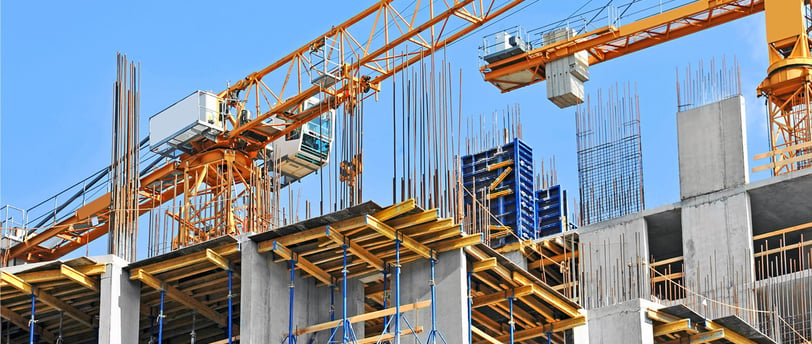Add your promotional text...
Accelerating India's Infrastructure: The Role of Small-Cap Companies in the Construction Boom
Synopsis: India's construction sector is undergoing a rapid transformation, with small-cap companies at the forefront, leveraging advanced technologies to expedite project completion and enhance efficiency.
INVESTMENT IDEAS SMALL CAP
By Runjhun Tripathi & Zabina Gafoor
12/30/20243 min read


India's construction landscape is experiencing a significant shift, characterized by the swift completion of large-scale projects. A notable example is the recent construction of a factory unit spanning 151,000 square feet, completed in a mere 150 hours at a cost of ₹19 million. This remarkable achievement underscores the industry's move towards rapid project delivery, aligning with the nation's broader economic and infrastructural development goals.
Advancements in Construction Technology
The adoption of modern construction methodologies is central to this transformation. Key technologies include:
Modular Construction: This approach involves creating building components in a factory setting, which are then transported to the construction site for assembly. This method significantly reduces on-site construction time and enhances quality control.
Precast Concrete Structures: In this technique, concrete elements are cast in a controlled factory environment and then assembled on-site. This process improves efficiency and allows for better customization.
Prefabricated Buildings: Entire structures or modules are manufactured off-site and transported either as fully built units or in semi-assembled forms, streamlining the construction process.
Pre-Engineered Steel Buildings: Steel components are fabricated in factories and then assembled on-site, offering flexibility and durability, particularly beneficial for industrial and large-scale commercial projects.
While these technologies have seen limited adoption in India compared to countries like China, the landscape is changing. Factors such as rapid urbanization, substantial investments in infrastructure, housing, e-commerce, and manufacturing are driving the demand for faster and more efficient construction solutions.
Advantages of Modern Construction Techniques
The benefits of these advanced construction methods are multifaceted:
Time Efficiency: Significantly reduces construction timelines, enabling quicker project turnovers.
Labor Optimization: Decreases reliance on extensive on-site labor, mitigating challenges related to labor shortages.
Scalability: Facilitates mass production and automation, allowing for the efficient scaling of construction projects.
Environmental Sustainability: Promotes eco-friendly practices by minimizing waste and optimizing resource utilization.
Cost Effectiveness: Reduces overall construction costs through improved efficiency and resource management.
Key Players in India's Pre-Engineered Building (PEB) Sector
Several companies are leading the charge in adopting and implementing these advanced construction technologies:
Interarch Building Products Ltd.: A prominent player in the pre-engineered construction industry, Interarch collaborates with clients from the project's conception stage. Their clientele includes major corporations such as Amazon, the Tata Group, and Flipkart. With a manufacturing capacity of 161,000 metric tons per annum, Interarch is among the fastest-growing entities in the PEB sector. The management aims to double revenue within the next three to four years, targeting a 15-20% profit growth for the fiscal year 2025.
Pennar Industries: Diversified in engineering products and solutions, Pennar Industries derives 49% of its revenue from the PEB segment. With an international presence and a capacity of 90,000 metric tons as of FY24, the company focuses on high-margin segments, including the U.S. market, and aspires to achieve a 20-25% compound annual growth rate (CAGR).
Everest Industries Ltd.: With 27% of its revenue stemming from pre-engineered buildings, Everest Industries also engages in conventional building products. The company boasts a manufacturing capacity of 72,000 metric tons and is actively expanding its market reach.
Emerging Players in the Precast Construction Space
The precast construction segment is witnessing the emergence of notable companies:
PSP Projects: A construction firm operating a precast plant for the past three years, PSP Projects recently collaborated with the Adani Group, signaling its growing prominence in the industry.
Ganesh Housing Corporation: Based in Gujarat, this real estate developer has incorporated precast construction technology into its projects, enhancing efficiency and project delivery times.
Puravankara: This real estate developer has a subsidiary dedicated to technology-enabled solutions, utilizing offsite construction technology to streamline building processes.
Additional Companies to Watch
Other firms contributing to the advancement of construction technology in India include:
NBCC (India): A government-owned corporation involved in project management and consultancy services for civil construction projects.
J Kumar Infraprojects: Specializes in urban infrastructure development, including metro rail projects and flyovers.
APL Apollo Tubes: Manufactures structural steel tubes, essential components in modern construction techniques.
Beardsell Ltd.: Engages in the production of prefabricated buildings and insulated panels, contributing to energy-efficient construction solutions.
Hi-Tech Pipes: Produces steel pipes and tubes, playing a vital role in the infrastructure sector.
Investment Considerations
Investors should exercise due diligence when evaluating opportunities in this evolving sector. While the adoption of advanced construction technologies presents significant growth potential, it is essential to assess each company's financial health, market position, and strategic direction.
The technological evolution across various sectors in India has historically led to substantial wealth creation. The construction industry appears poised to experience a similar trajectory, with small-cap companies playing a pivotal role in driving this transformation.
